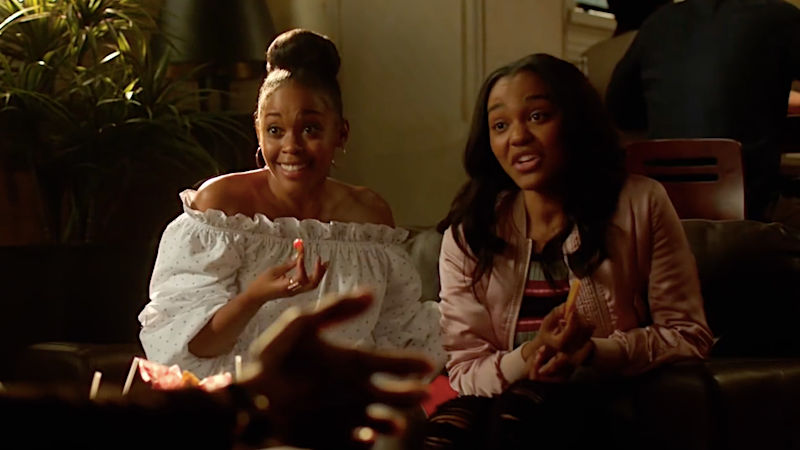A post-season reflection and summary of the series Black Lightning on The CW. #BLM (Black Lightning Matters!)
Warning: May contain spoilers.
While the premise of yet another superhero show may seem a bit overused and blase amidst shows like Supergirl, The Flash, Legends of Tomorrow, The Arrow, and movies like The Avengers and Black Panther, I guarantee that Black Lightning is nothing like you’ve ever seen before.
The storyline actually dates back to 1977 when DC Comic writer Tony Isabella (who coincidentally also helped create Luke Cage) originally pitched the idea for Black Lightning, but only was able to write and publish 11 issues before the series was cancelled.

Vol. 9 of the original Black Lightning comic book courtesy of Comic Vine.
Luckily, the show was picked up in May of 2017 by The CW. The TV adaptation features an almost all Black cast and crew, directed by Salim Akil, with Cress Williams playing the titular role of Black Lightning (Jefferson Pierce), Christine Adams as his ex-wife Lynn Pierce, Nafessa Williams as their daughter Anissa, and China Anne McClain as the youngest daughter named Jennifer.
Despite a number of people claiming the acting, special effects and costumes make the show unwatchable, I don’t find this to be true at all. So viewers, pay no heed to the 53% audience score on Rotten Tomatoes. This show made me laugh, on several occasions it made me cry, and through it all, Black Lightning remained refreshingly light and socially relevant. (The perfect blend of a quality superhero show and social justice is nice to see, after that whole mess of a crossover where the rest of the DC superheroes fought nazis in an alternate universe, or something dense like that). Although the special effects do sometimes leave something to be desired, they are quickly redeemed by clever cinematography and epic fight scenes.
One thing that makes the show quite enjoyable is its ability to switch between being poignant and intense, to playful and humorous, allowing the viewer to experience a journey of emotions in a single 40 minute episode. Amid gun violence, torture, and other heavily graphic scenes, there is also an equal amount of domestic content. Jefferson, Lynn and their two daughters experience ordinary, everyday life together too, with its daily struggles and exultations.
Black Lightning is unique in the fact that while three of the main characters are Black superheroes, neither their ethnicity nor their powers are their most defining or interesting characteristics.
Jefferson is also the kind-hearted principal of Freeland High School where he empowers his students and teaches them the importance of respect and education. Anissa is a protective older sister and revolutionary who wants to inspire and teach people like her father. Jennifer is a headstrong yet sincere teen who is trying to figure out both her social life and love life. (And Lynn is a genius neuroscientist who glues the family together.)
https://www.instagram.com/p/Bg1wk3ojKhZ/
In addition to this, “Thunder”, the eldest daughter of Black Lightning played by Nafessa Williams, has made TV history by portraying television’s first Black lesbian superhero. A hardcore activist and resident bad*ss who fights for what she believes in, Anissa Pierce also fights battles using her ability to change density and become hard like a boulder. Her sister Jennifer (Lightning) later obtains the power to generate electricity as well, and the show navigates these two girls coming to terms with their immense power and responsibilities.

Courtesy of io9.gizmodo.com and The CW
Not only does it include an all-Black family of superheroes with super sweet powers, but the whole series is an ode to the Black community, with subtle nods to Black history mingled into the plot.
From the iconic song “Strange Fruit” written by Abel Meeropol in the beginning of the first episode, to Pierce’s school mantra which alludes to the infamous speech of Malcolm X, “By Any Means Necessary”, Black Lightning gives back in a way that no show has before. The soundtrack also features original compositions by a plethora of Black artists.
Lastly, Black Lightning isn’t just some happy-go-lucky live adaptation of The Incredibles.
The show touches on pivotal issues such as racism, political and governmental corruption, police brutality, the inequality of the criminal justice system, the school to prison pipeline, as well as drug and gang issues within groups of lower socioeconomic status. Between the fictional drug Green Light destroying Black communities, the protests staged to take down confederate statues, and Freeland rallying to save Black youth from violence, the show is so genuine that it could be mistaken for real life. It is evident by the director’s commentary that the authenticity and intensity of the show are, in fact, intentional. Akil says he does not want to distance the show from the realities and hardships of life.
The CW has already renewed the show for a second season as of April 2nd, so avid fans need have no fear. It seems that diverse, ingeniously crafted shows actually matter to this network. (But we’re not still salty about the cancellation of The Get Down and Sense8 on Netflix, right?).
At any rate, this show deserves all of the praise and attention it has gotten for its dedication to diversity and excellent storytelling. Even though Black Lightning has undeniably been a triumph for both the cast and The CW network, this is only the beginning.
We need to keep this momentum going, and push for more diversity in other genres of television, until the day comes where all little kids can turn on the television and see themselves represented on the screen.
Cover Image Courtesy of readysteadycut.com










